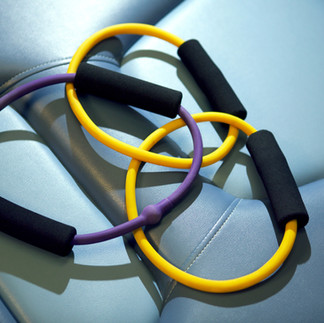The Importance of corrective exercise
- N'Namdi Nelson

- Jun 10, 2021
- 3 min read
Updated: May 1, 2022
What is the first thing that comes to mind when you think of reasons why people workout and join fitness programs ….. (This is where you look away from your device and think for a moment 😊). One reason why I train is to keep up with my kids because they have an unlimited supply of energy. Another reason is… ok I’ve stalled enough, here are some of the most common reasons I’ve heard over the years: I want to lose X amount of pounds/ I want to tone my arms & legs/ I want to tone my butt/ I want a six-pack/ I want to run a faster 40-yard dash/I want to bench press 185 at least 10 times/ and you get the picture.
Now there is nothing wrong with any of those reasons, goals are what motivate people to train. Less common reasons I get are to improve flexibility or because they want to just feel good about themselves. And someone rarely wants to train to alleviate or prevent pain in their back/knee etc. This is a fair assessment because when people experience pain the 1st professional that comes to mind is seeing a doctor or physical therapist.
In my experience, I've noticed if the cause of the pain derives from some type of muscle imbalance or malalignment then the majority of the exercises done in physical therapy can be performed with a competent personal trainer. The reason why doctors & physical therapists don’t feel comfortable transferring care to personal trainers is that anyone can call themselves a personal trainer without completing the required leg work to be a certified personal trainer. Here is an example of this scenario.
John who drives for Uber is also a member of his local gym. John has a “desired” physique and other members take notice. These members ask John for tips on fitness & nutrition and some even ask if he could train them. John has no background in fitness & nutrition but decides to make a few extra bucks training people after work at his local park. John gains a reputation as a personal trainer locally. The moral of this story is anyone can call themselves a personal trainer, but you can’t just call yourself a physical therapist. This is why doctors/physical therapists hesitate when referring their patients to personal trainers unless they know their background. This is also why people like John give personal trainers a bad name.
I’ve found myself writing a lot of corrective exercise programs over the past couple of weeks. A few weeks ago, I met someone who wanted me to help them get in shape and lose a few pounds. In the first workout, I notice they were having trouble performing a type of squatting pattern, then they revealed to me they had been experiencing pain in a particular joint for quite some time. I referred them to a doctor who did an x-ray, then this person showed me the x-ray. Immediately I was able to identify the cause of the pain and I shifted my focus from their original training goals to getting rid of the pain. After the 1st two sessions, this person was able to perform the original exercise that caused them discomfort, pain-free.
I had another person who was experiencing pain and discomfort in the hips. As they performed different lunging patterns it was clear they had mobility restrictions in their hips. So, I provided them with a corrective exercise program to follow and did it with them in a session. After the session, they told me they felt much better. I said to them “wouldn’t it be great to feel like this all the time? You just have to continue this on your own”.
Corrective exercise is essential and can be performed by a certified personal trainer. A corrective exercise specialist is an expert in human movement assessment. We can accurately analyze a person's movement patterns, and identify overactive and underactive muscle groups and compensations. Although I would not mind doing it, corrective exercise does not have to be performed for the entire workout. I like to sprinkle it in during the warm-up or strategically during the workout depending on the severity of the problem. I also do it for maintenance to prevent issues from reoccurring. If you are currently experiencing pain or discomfort or have symptoms that come and go, reach out to me. Let us figure out what’s going on together.
N'Namdi Nelson, M.B.A, CSCS, ACSM-EP, PES, CES










Chudovo is a professional .NET development and consulting company that has been operating since 2006. Its team includes experienced .NET architects and .NET software engineers with domain expertise in different industries, including healthcare, finance, logistics, education, etc. This .NET engineering team can deliver reliable web solutions, performant desktop applications, responsive mobile apps, multi-component enterprise systems, AI solutions, etc.